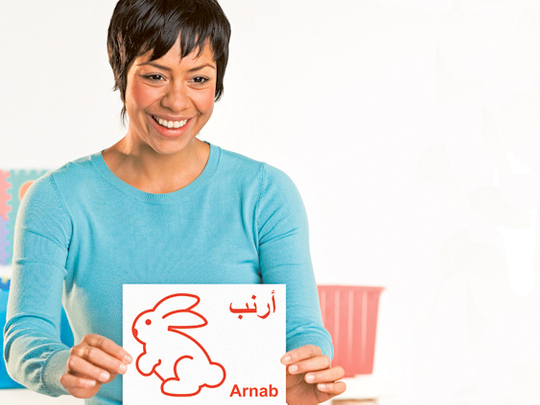
Every language has a beauty that goes unnoticed by those who do not know it or don’t understand it. Learning a language is a privilege, an asset. When children learn a language in school, it is an added source of knowledge and information they will benefit from lifelong.
As a non-Arabic speaking parent, I would often wonder about how I could help my daughter learn the language. With over 15 million non-Arabic speaking expatriates in the Middle East facing the same challenge, I am not alone.
As a creative writer, I have lived in the UAE for over 11 years. Eight of them went by without knowing how to speak or understand Arabic. And then my little girl stepped into kindergarten and it became necessary for me to pay attention to the language. To me, the language seemed difficult and and I was apprehensive about learning it. But there’s something magical about being a parent. You start discovering how to learn again. Every little thing that once went past your eye unnoticed suddenly begins to grab your attention. And so you begin, exploring again, discovering again, creating again and inevitably… learning again.
So I, like thousands of others parents, picked up my pencil, opened my daughter’s Arabic book and went back to kindergarten with her, in spirit. Not only did I find it fun but I also started enjoying it. In fact, we both did. In my process of discovery, I realised that one of the best ways to help my daughter learn was to make her teach.
She felt empowered and encouraged and of course… she enjoyed the fact that she was in charge. (I, on the other hand, had my cake and ate it too. While she was enjoying teaching me, she was also learning, from herself!)
Once I made the decision to learn, the challenges didn’t get any smaller. In fact, like thousands of other parents, I now came face to face with how real the problems were.
As a parent, and often as a working parent, learning a foreign language is daunting. Add to that, limited resources, almost no exposure and no real point of reference.
I asked a few parents on how they tackle this.
“When my daughter started learning Arabic in school, I decided to learn along-side but very soon, I felt quite helpless.” says Aislinn D’Souza, a parent. “With no references or material, I didn’t know where to start. I felt left behind and now I’m quite lost. She’s moved ahead and I do not know how to assess her learning or support her. I feel it’s crucial that parents be included in some way in the Arabic learning process. It’s really important that we learn in parallel. But the question is: how?”
“I used to refer to online sites but found it hard as the information available doesn’t relate to the school syllabus. When my son needed help, I couldn’t respond, as I didn’t know the answers. I know he sensed this and slowly stopped asking me,” says Lakshman Srikanth.
Harvey Ellis, father of 7-year-old Lucas agrees that there is a crucial need for innovative resources in this area. “Living in Dubai, coming from a
Western background, and learning Arabic for a child can be daunting. Coaxing your child to take an active and prolonged interest in learning Arabic at school, and at home, is important. Therefore, the challenge for an Arabic teacher or for any parent is to try and find more innovative means.”
“I don’t really know how to help in my child learn the language, so I leave it up to her to learn whatever she does in school. But I find that her interest is dipping and I can see her struggle.” says Darshana Thakkar, mother of a 7-year-old girl.
“The role of the parent at home is very crucial to the learning process, but the main problem that many expat parents face when trying to help their children learn Arabic is that there are very few interactive resources available, especially for young learners,” says Rania Abu Ghush Hindiyeh, Primary Arabic AFL coordinator, Deira International School.
So, how can this situation be redressed? How can we make the learning of Arabic, for expat children, an experience of joyful discovery of a new language? How can we make them see the larger picture, that this is a glorious oppurtunity to learn a beautiful language and be able to more closely understand the culture and heritage of the country they live in?
Learning Arabic, the way it is currently taught, has little to do with the larger picture itself, which is: truly learning and understanding the language. Currently, the learning is not experiential and is based more on rote and theory rather than practical applicability.
Over the next few weeks, I will share my ideas with you on how parents can make learning Arabic more fun for their children. Because I believe that motivated parents lead to motivated children.
One of the strategies that I find works well is beginning with the basic words. The building blocks of alphabet and simple words. And instead of teaching them in a direct, predictable way, make the experience fun by using the medium of games. Creative learning has been proven to be the most effective way of teaching children new information they will retain forever.
Let’s make learning arabic fun!
One of our favourite things to do is to take a game my daughter Keya loves and turn that into a lesson. This makes Arabic lesson time full of excitement, laughter and learning… for us both.
1) Dumb Charade
Make a few flash cards with words that your child is learning in school. Now take turns picking the cards up and acting them out with actions alone. Player 1 acts and Player 2 guesses. Then reverse roles.
A simple example:
Player 1, the parent, acts out a rabbit.
Player 2 (your child) guesses: “Arnab!” (the Arabic word for rabbit).
You can use this for all the words and create a planner with regular lessons to cover all the words your child is learning.
NEXT WEEK: More learning games and focus on Arabic teachers and the challenges they face in the classroom.
Write to us if you want to share your experience or feedback: education@gulfnews.com












